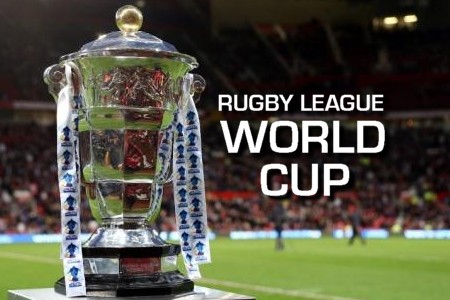Its amazing to think that after so many years of waiting, the 2008 Rugby League World Cup is now behind us.
After setbacks, questions about whether it would even be run, countless doubters and a cynical supporters base wondering if they would get it right, you have to give the organizers credit for pulling together a great competition that brought new feelings and emotions to even the most hardened Rugby League fan.
So now we turn our attention to the future and what lies ahead for the future of the Rugby League World Cup.
Unlike the aftermath of the 2000 tournament, there is a real sense of optimism and an eagerness to look towards a future World Cup.
So now that we have hindsight to prepare us for the next time around, what changes should be made to the future World Cups and what can be done better.
Lets have a look at it shall we?
The Hosts
Its pretty obvious that the next World Cup should be held in Australia and New Zealand as that’s where the majority of Rugby Leagues international communities lie.
Fans of Australia, Tonga, Samoa, PNG and New Zealand all managed to really get behind the World Cup and at the end of the day these are all the communities that support the game at all levels.
Playing the World Cup in Australia worked well with TV times too, with the game on at a decent hour in all Pacific nations and even in Europe where they were on in the morning rather than 2am at night.
You would think the next time around some games would be played in New Zealand itself, while I also wouldn’t be surprised if maybe PNG, Samoa, Tonga or Fiji ended up hosting a game or two between them.
Having attended Samoa vs Tonga at Penrith, the atmosphere was unbelievable, I can’t even imagine what it would be like if those games were played in the Pacific Islands.
One last point to make, the World Cup needs to keep the big end of town happy, and when it comes to Rugby League, Australia is the big end of town.
When the World Cup is played in Europe, its a case of out of sight, out of mind. All our players go over, we get results in the paper the next day, we hear about injuries instead of watching great games and you end up with the World Cup being a bit of a pain in the arse to everyone.
By holding it in Australia you open peoples eyes, you keep their interest, you feed the need for more football.
Venues
I think they got it right when they decided to play games at some of the “smaller” venues, rather than being dragged into the thought that every game should be played at a 40,000 seat stadium.
There were some very good crowds at this World Cup and in the smaller stadiums they made for a great atmosphere.
Next time around they will be very tempted to go bigger, but personally I think they should stick to what they did and not even think of going to bigger venues. Worry about bigger venues if games are being sold out.
I think the only really bad choice of venue was probably Australia’s Semi Final versus Fiji. That game was always going to include one of the big sides against one of the minnows and it would have been better to be held in say Parramatta or even up in Newcastle.
I think the Final should be held in Suncorp Stadium once again as its simply second to none.
Competition Format
People were critical for the competition format going into the World Cup but at the end of the day it provided good, close games, lots of unpredictable upsets and it must have had others sports watching and wondering if they should adopt a similar approach to their own World Cups.
I think we might see a few little changes made however next time around, probably just to sort out a few minor issues.
I felt that there was a bit of a lull in public interest after Australia has thrashed England and everyone knew they would not play another competitive game until the Final. I think next time around Australia will probably start the tournament with a big game, say against England, and then they wont play New Zealand until they are just about to head into the Semi Finals.
I also think there needs to be a bit of work on the semi finals and how teams get there.
I wouldn’t mind seeing only the top two teams from the “Super Group” being assured of a place in the Semi’s, with the third ranked team having to play off with say the winners of Group B and C and maybe the next best team in the tournament for a place in the Semi Finals.
I also think they need to look at playing the B and C Group games over a longer period of time rather than within a few days of each other. I think the quick turn around some teams had really effected the end result of a lot of games.
These are just all minor tweaks though to a format that has proven to be a winner.
The Lead Up
I think the organizers were very lucky that the poor lead up to the World Cup didn’t come back and bite them on the arse.
Most teams come into the competition having not played a game for at least a year, and many of the teams such were coming into camp having never played at this level together before.
I think the next time around, as soon as the NRL and Super League seasons finish, teams need to get into camp and the smaller nations in particular should be playing warm up games against each other.
I don’t think it is as important for Australia or New Zealand, but England should be straight on a plane down under and getting as many warm up games against World Cup opposition and in Australian conditions as they possibly can.
While it is a fine line between having teams ready for the World Cup, and not wearing out players before the World Cup is over, I think with the competition format we have and the fact the most World Cup games you can possibly end up playing is five (If you make the Final), then you would rather want teams ready to go then just hitting their stride as their pool games come to a close.
Sponsors, Broadcasters And Kick Off Times
The organizers of the 2008 World Cup got it right as far as pleasing sponsors goes. Finally we saw sponsors being given good air time for going out on a limb and supporting this competition and it should be more of the same the next time around.
The broadcasters were forced to promote the people that made the 2008 World Cup possible as well as promoting the official World Cup web site. I got a little chuckle out of knowing Channel Nine were forced to do this.
I think next time around they need to change the kickoff times for the big games.
It was completely ridiculous to have games kick off at 8pm on a Sunday night. Sure it was good for TV (Who actually delayed the coverage anyway so it made no difference to them!), but for fans it was a nightmare.
Having to travel from Western Sydney into the city on a Sunday night, and then worry that after the match you had to rush to the train station so you could actually get home is not what is needed.
People have lives to live, they have work on Monday morning and they have kids to get to school. How could you take a young family to the game at 8pm on a Sunday night? You just couldn’t do it!
I’ve said for a long time now that no Rugby League game should kick off any later than 7pm. That means its all over by 9pm and everyone can get home at a reasonable time. Its not good catering for the single 20-30 year old’s alone, the game needs to make sure games are played at a time when as many people as possible can attend at match.
Getting People Involved
One great thing I got out of this World Cup was a sense of how the Rugby League community is made up of so many different cultures.
Is there any other game in the whole world that boast that it touches the lives of so many different nations with such different backgrounds. From the freezing North of England to the tropical jungles of Papua New Guinea, people from so many backgrounds love this game and fllow it every week.
Seeing this World Cup showed that, in a perfect side, you’d have a mix of all the styles thats come together in this competition.
You have the toughness of the Australians, the flamboyance of the Fijians, the size of the Samoans, the athleticism of the Tongans, the passion of the Papuans….it all comes together to form this great game of ours.
Next time around I would like to see the organizers really take the game to these communities, especially in Australia.
The Tonga, Samoan and Fijian sides should get out to the local community churches and support the same people who support them.
Australia publicize training sessions they hold in places like Blacktown and Liverpool, take the game to the people that love the game.
I saw during this World Cup that so many communities come out of the woodwork and proudly supported their countries. For many of them, it was their one real opportunity to get out and support their nation on the sporting field.
This needs to be carried on in future World Cup,s because at the end of the day you can talk all you like about the sport, but the reason we play the game is to bring people together from all walks of life to have a bit of fun.





